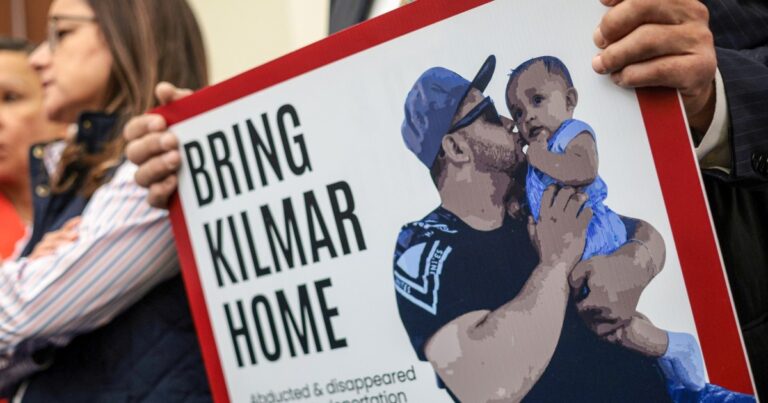Kilmar Abrego Garcia, the Maryland man whose erroneous deportation to El Salvador became a protracted battle over due process and a test of wills, has been returned to the United States to face human smuggling charges in Tennessee.
Attorney General Pam Bondi said Friday in a news conference that he had landed in the U.S.
Abrego Garcia has been named in an indictment charging him with transporting within the U.S. people not legally in the country. The two-count indictment, sealed by a Tennessee court last month, alleges that Abrego Garcia participated in a conspiracy over several years to move people from Texas deeper into the country, NBC News has learned.
The two-count indictment alleges that those transported included members of the MS-13 gang and that he worked with coconspirators.
The Justice Department said that Abrego Garcia used his status in MS-13 to “further his criminal activity.”
The indictment alleges that from about 2016 to 2025, Abrego Garcia and others conspired to bring migrants illegally to the United State from Guatemala, El Salvador, Honduras, Ecuador and elsewhere, through Mexico and across the Texas-Mexico border.
Abrego Garcia and a co-conspirator “ordinarily picked up the undocumented aliens in Houston, Texas area” after they had crossed the border. The pair then allegedly would transport “the undocumented aliens from Texas to other parts of the United States to further the aliens’ unlawful presence in the United States,” the indictment said.
In the indictment the government said Abrego Garcia and co-conspirators communicated using cellphones and social media to unlawfully transport the undocumented immigrants.
The government alleged that Abrego Garcia and co-conspirators collected financial payments from the immigrants and transferred money between one another to conceal the origin of the payments.
Abrego Garcia’s attorney Simon Sandoval-Moshenberg said bringing him back for prosecution “is an abuse of power, not justice.”
“The government disappeared Kilmar to a foreign prison in violation of a court order,” Sandoval-Moshenberg said in a statment. “Now, after months of delay and secrecy, they’re bringing him back, not to correct their error but to prosecute him. This shows that they were playing games with the court all along. Due process means the chance to defend yourself before you’re punished, not after.”
A federal judge and the U.S. Supreme Court in April ordered the federal government to facilitate Abrego Garcia’s return to the U.S., but the administration dragged its feet and resisted. At times the administration insisted that his return was up to El Salvador President Nayib Bukele, who refused to send him back.
The administration had accused Abrego Garcia of being a member of the MS-13 Salvadoran gang and gave that as reason to deport him, despite a judge’s order from 2019 barring him from being sent to his home country.
Abrego Garcia’s wife has insisted that he was not involved in criminal activity. “Kilmar worked in construction and sometimes transported groups of workers between job sites, so it’s entirely plausible he would have been pulled over while driving with others in the vehicle,” his wife previously said in a statement. “He was not charged with any crime or cited for any wrongdoing.”
Garcia was deported March 15 amid a flurry of arrests and deportations after Trump invoked the Alien Enemies Act, a law only used before in wartime, to target Venezuelan immigrants and other immigrants he alleged to be gang members and “invaders” of the U.S.
He was taken to the notorious CECOT prison in El Salvador, known for its harsh and brutal conditions. Government attorneys had said he was taken there as a result of “administrative error.”
The Supreme Court ruled in April that Abrego Garcia’s removal was “illegal” and determined that a judge’s order for the administration to facilitate his return was proper.
Initially the administration said it had deported Abrego Garcia in error, but as calls for his return intensified, the administration doubled down on keeping him incarcerated in El Salvador.
Despite orders to bring him back, the administration stood its ground repeatedly, raising concerns about its defiance of the judicial branch and setting off threats of contempt from the bench.
A federal judge ordered the Trump administration just last week to give hundreds of migrants in El Salvador’s CECOT prison the chance to challenge their detentions and removals.



